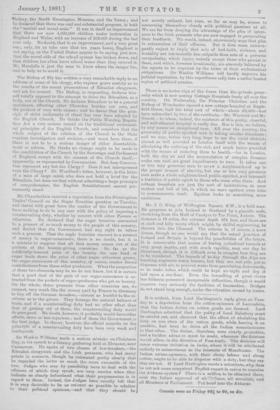Mr. Chamberlain received, a deputation from the Birmingham Trades' Council
on the Sugar Bounties question on Tuesday, and stated with great force the resolve of the Government to have nothing to do in any case with the policy of imposing a countervailing duty, whether by concert with other Powers or otherwise. Be declared that the sugar bounties amounted to a present of so much money to the people of this country, and denied that the Government had any right to refuse such a present. That the sugir bounties amount to a present of money to sugar-consumers, there is no doubt, but it is a mistake to suppose that all that money Comes out of the pockets of the bounty-giving countries. So far as the artificially-lowered price of the bounty for one kind of sugar beats down the price of other sugar otherwise grown, the sugar-consumers of this country, of course, receive forced contributions from these other producers. What the proportion of these two elements may be we do not know, but it is certain that a good deal of the gain of our sugar-consumers is ex- tracted from the pockets of sugar-producers who get no bounty. On the whole, these presents from other countries are, we suspect, very much like the money paid by France to Germany to buy off the German invaders,---almost as hurtful to the re- ceivers as to the givers. They derange the natural balance of trade, and if a countervailing duty had no other effect than that of getting rid of them, the countervailing duty would do pure good. No doubt, however, it probably would have other effects, more or less injurious ; and of these the Government is the best judge. in theory, however, the official assaults on the principle of a countervailing duty have been very weak and inadequate.














































 Previous page
Previous page